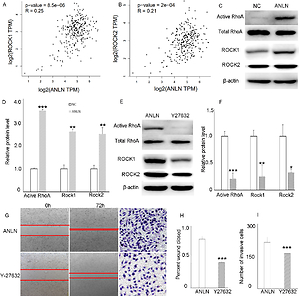Current issue
Archive
Manuscripts accepted
About the Journal
Editorial office
Editorial board
Section Editors
Abstracting and indexing
Subscription
Contact
Ethical standards and procedures
Most read articles
Instructions for authors
Article Processing Charge (APC)
Regulations of paying article processing charge (APC)
ONCOLOGICAL GYNECOLOGY / RESEARCH PAPER
ANLN promotes cell migration and invasion through
RhoA-ROCK signaling in cervical cancer
1
Department of Gynecology, The Second Hospital, Cheeloo College of Medicine,
Shandong University, Jinan, Shandong, China
Submission date: 2020-08-28
Final revision date: 2021-03-09
Acceptance date: 2021-03-25
Online publication date: 2021-03-28
Corresponding author
KEYWORDS
TOPICS
ABSTRACT
Introduction:
Anillin actin binding protein (ANLN) is involved in various human cancers. It is often upregulated in various cancers, including cervical cancer (CC). However, the exact role of ANLN in the modulation of CC and the underlying molecular mechanism remain unknown. In this study, we aimed to investigate the effects of ANLN on the proliferation, migration, and invasion of CC cells, as well as to determine the molecular mechanisms underlying these effects.
Material and methods:
ANLN expression levels were analyzed in normal cervical and CC specimens using public databases and tissue samples. The prognosis was determined using the TCGA database. Cell proliferation, migration and invasion were measured by Edu assay, wound-healing assay and transwell assay, respectively. Immunofluorescence was used to examine the influence of ANLN inhibition on actin stress fiber integrity. Western blots were used to measure the protein expression.
Results:
ANLN expression levels in CC were higher than those in normal tissues, and ANLN overexpression was highly correlated with poor prognosis. ANLN knockdown inhibited CC cell proliferation, migration, and invasion in vitro, while ANLN overexpression led to an inverse biological phenotype. Immunofluorescence showed that ANLN inhibition could influence actin stress fiber integrity. ANLN expression was positively correlated with ROCK1 and ROCK2 expression in CC. Overexpression of ANLN activated RhoA and upregulated ROCK1 and ROCK2. Furthermore, ROCK1 and ROCK2 expression levels were also impeded by Y27632, which is a specific inhibitor of RhoA. They also weakened the migration and invasion ability in ANLN-overexpression HeLa cells.
Conclusions:
ANLN promotes cell migration and invasion through RhoAROCK signaling in CC.
Anillin actin binding protein (ANLN) is involved in various human cancers. It is often upregulated in various cancers, including cervical cancer (CC). However, the exact role of ANLN in the modulation of CC and the underlying molecular mechanism remain unknown. In this study, we aimed to investigate the effects of ANLN on the proliferation, migration, and invasion of CC cells, as well as to determine the molecular mechanisms underlying these effects.
Material and methods:
ANLN expression levels were analyzed in normal cervical and CC specimens using public databases and tissue samples. The prognosis was determined using the TCGA database. Cell proliferation, migration and invasion were measured by Edu assay, wound-healing assay and transwell assay, respectively. Immunofluorescence was used to examine the influence of ANLN inhibition on actin stress fiber integrity. Western blots were used to measure the protein expression.
Results:
ANLN expression levels in CC were higher than those in normal tissues, and ANLN overexpression was highly correlated with poor prognosis. ANLN knockdown inhibited CC cell proliferation, migration, and invasion in vitro, while ANLN overexpression led to an inverse biological phenotype. Immunofluorescence showed that ANLN inhibition could influence actin stress fiber integrity. ANLN expression was positively correlated with ROCK1 and ROCK2 expression in CC. Overexpression of ANLN activated RhoA and upregulated ROCK1 and ROCK2. Furthermore, ROCK1 and ROCK2 expression levels were also impeded by Y27632, which is a specific inhibitor of RhoA. They also weakened the migration and invasion ability in ANLN-overexpression HeLa cells.
Conclusions:
ANLN promotes cell migration and invasion through RhoAROCK signaling in CC.
Share
RELATED ARTICLE
We process personal data collected when visiting the website. The function of obtaining information about users and their behavior is carried out by voluntarily entered information in forms and saving cookies in end devices. Data, including cookies, are used to provide services, improve the user experience and to analyze the traffic in accordance with the Privacy policy. Data are also collected and processed by Google Analytics tool (more).
You can change cookies settings in your browser. Restricted use of cookies in the browser configuration may affect some functionalities of the website.
You can change cookies settings in your browser. Restricted use of cookies in the browser configuration may affect some functionalities of the website.



